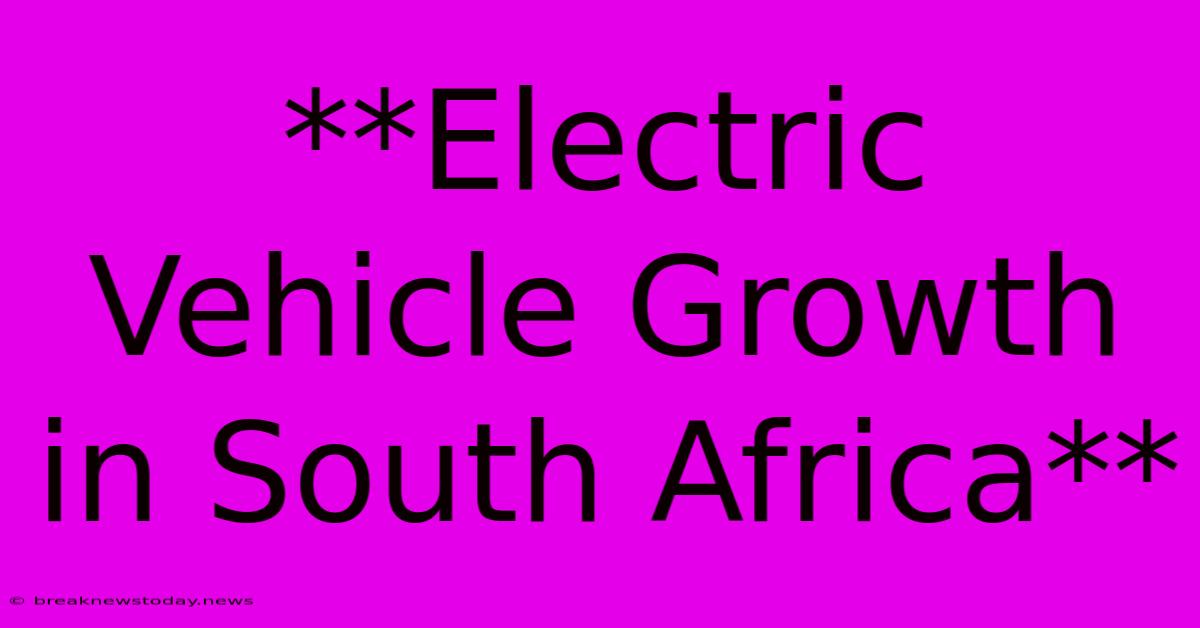**Electric Vehicle Growth In South Africa**

Discover more detailed and exciting information on our website. Click the link below to start your adventure: Visit Best Website naughtynakes.com. Don't miss out!
Table of Contents
Electric Vehicle Growth in South Africa: A Green Revolution on the Horizon?
South Africa, a nation known for its vast reserves of coal, is slowly embracing a new energy future. The electric vehicle (EV) market, once a niche sector, is experiencing a steady surge in popularity. While the transition to EVs in South Africa faces various hurdles, there are signs of progress, fuelled by government initiatives, technological advancements, and a growing awareness of the environmental impact of traditional vehicles.
The Driving Forces Behind EV Growth in South Africa
1. Environmental Concerns: With South Africa being a major carbon emitter, the need for clean energy solutions has become increasingly urgent. EVs, with their zero tailpipe emissions, offer a promising avenue for reducing greenhouse gas emissions and combating climate change.
2. Government Incentives: The South African government has introduced various incentives to encourage the adoption of EVs. These include tax breaks on EV purchases, import duty exemptions, and the development of charging infrastructure.
3. Technological Advancements: Battery technology is rapidly evolving, leading to increased range, faster charging times, and reduced costs for EVs. This progress is making EVs more appealing to a broader range of consumers.
4. Rising Fuel Prices: The volatile global oil market has led to significant increases in petrol and diesel prices, making EVs a more cost-effective option in the long run.
5. Growing Awareness: Public awareness of the benefits of EVs is increasing, driven by media campaigns, government initiatives, and the growing availability of EV models in the market.
Challenges to Overcome
1. Limited Charging Infrastructure: The development of a robust charging infrastructure remains a significant obstacle. While the government is investing in expanding charging networks, the current availability is still limited, particularly in rural areas.
2. High Initial Cost: EVs, especially those with longer ranges and advanced features, are still relatively expensive compared to traditional vehicles. This price barrier restricts their accessibility to many South African consumers.
3. Limited Model Availability: The range of EV models available in South Africa is still relatively limited, particularly compared to developed countries. This restricts consumer choice and can lead to higher prices.
4. Electricity Grid Capacity: The South African power grid faces significant challenges in terms of reliability and capacity. Integrating a large number of EVs onto the grid could strain existing infrastructure, leading to potential blackouts.
The Future of EVs in South Africa
Despite the challenges, the future of EVs in South Africa looks promising. Continued government support, technological advancements, and rising awareness are expected to drive further adoption. As the EV market matures, we can anticipate:
- Increased Model Availability: More EV models will be introduced to the South African market, offering greater choice and affordability.
- Improved Charging Infrastructure: The expansion of charging networks will make EVs more convenient and accessible to a wider range of consumers.
- Lower Battery Costs: Advancements in battery technology will continue to drive down battery prices, making EVs more affordable.
- Government Support: The government is likely to maintain its incentives and invest in research and development to further accelerate the transition to EVs.
The shift towards EVs in South Africa is a complex process, but it holds the potential to significantly reduce carbon emissions and promote a more sustainable future. Overcoming the current challenges is crucial to realizing this potential and creating a cleaner, greener South Africa.

Thank you for visiting our website wich cover about **Electric Vehicle Growth In South Africa**. We hope the information provided has been useful to you. Feel free to contact us if you have any questions or need further assistance. See you next time and dont miss to bookmark.
Featured Posts
-
Bundesliga Leverkusen Stuttgart 2 Nov
Nov 02, 2024
-
Partido Bundesliga Leverkusen Vs Stuttgart
Nov 02, 2024
-
K Onyango Chinas Poverty Reduction Model For Africa
Nov 02, 2024
-
Collins Dictionary Chooses Brat As Word Of The Year
Nov 02, 2024
-
Rapper Young Thug Sentenced To Probation
Nov 02, 2024
